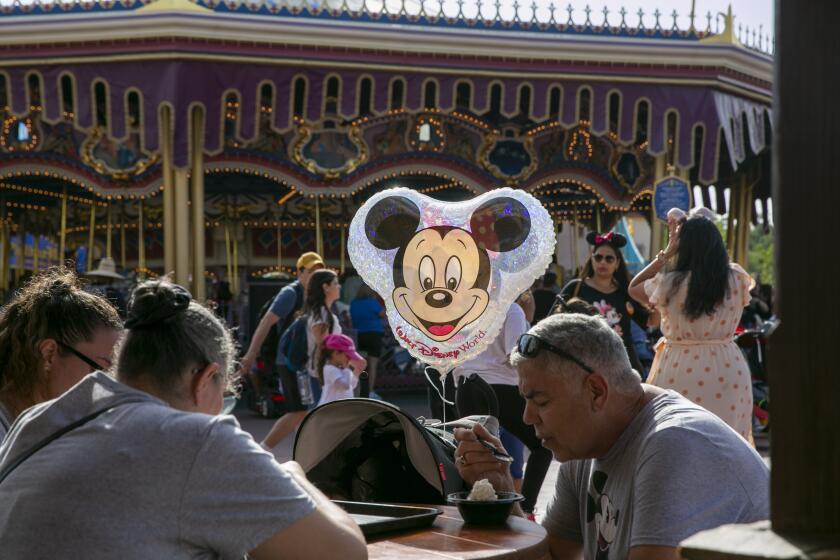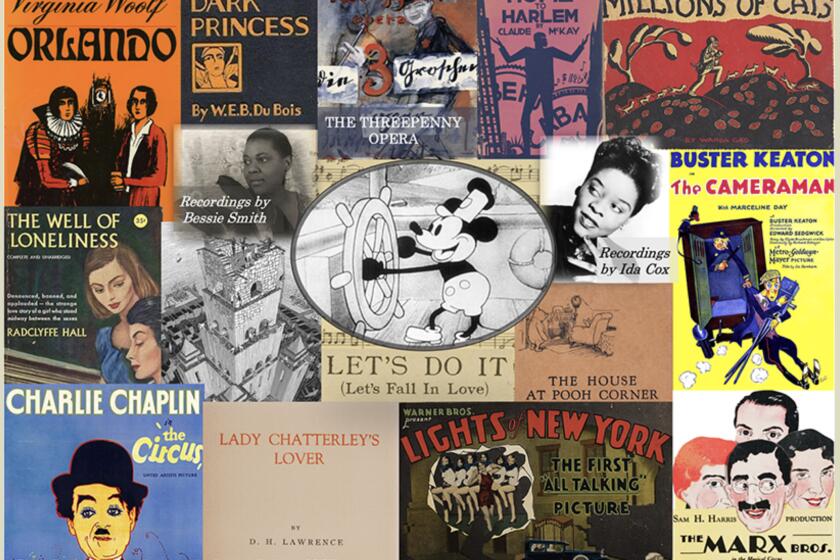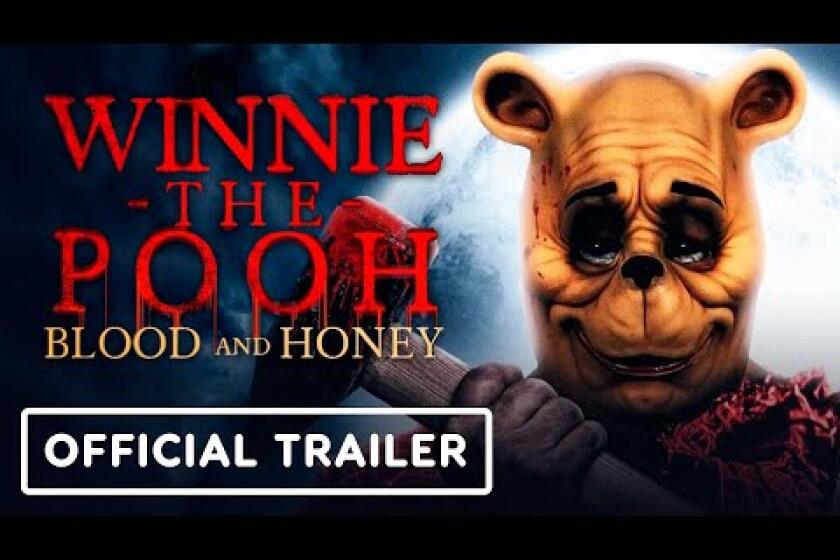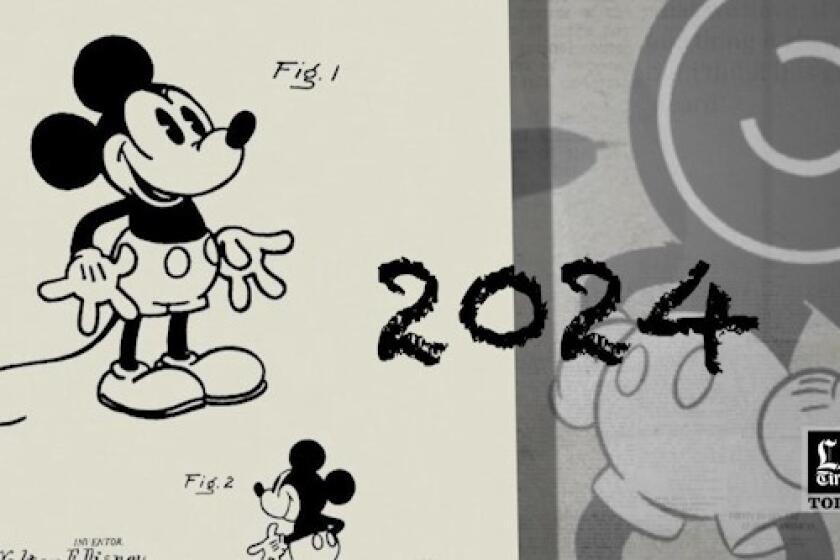Screamboat Willie? Mickey Mouse horror films lurk as cartoon enters public domain
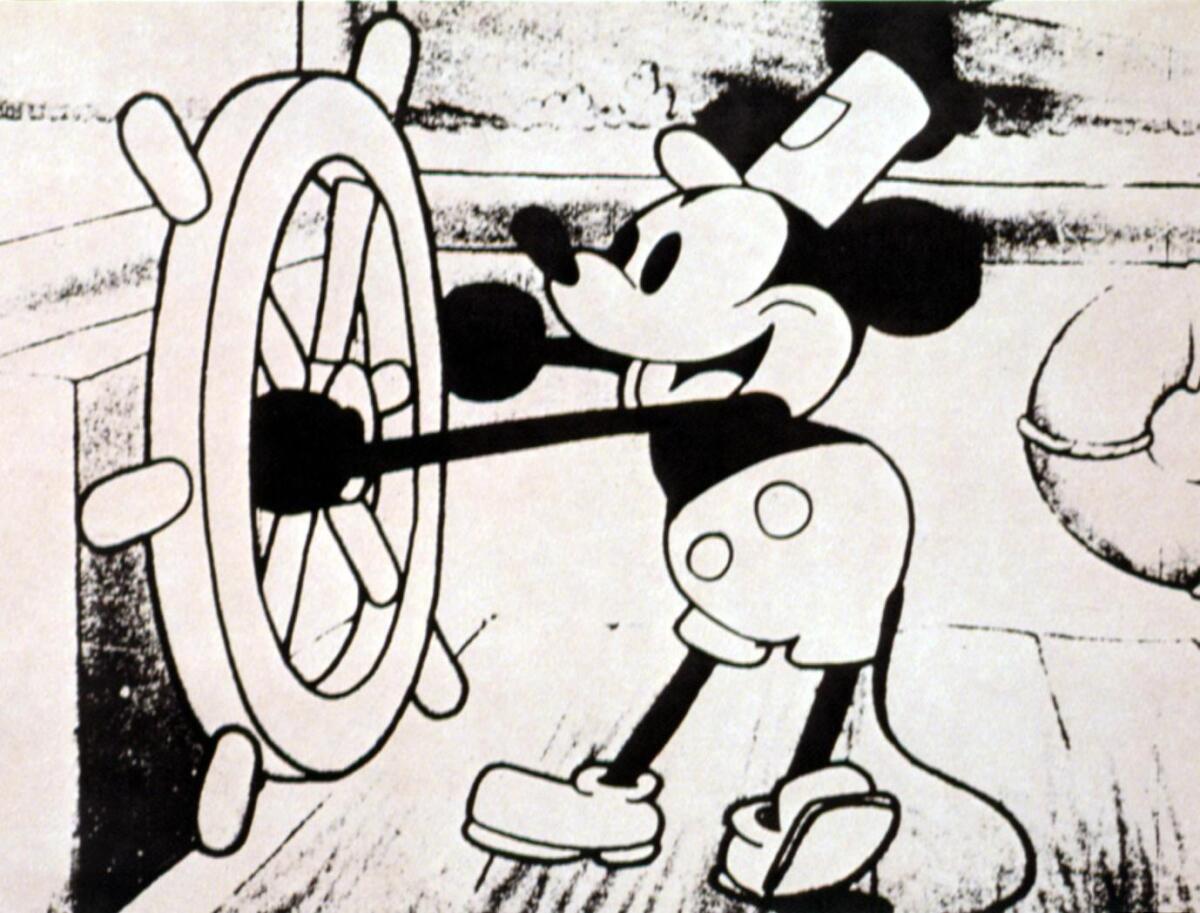
- Share via
Who’s the newest horror star that’s coming to the screen?
M-I-C-K-E-Y M-O-U-S-E.
At least two Mickey Mouse-inspired horror movies have been announced since 1928’s “Steamboat Willie” — which features the earliest version of the iconic character — entered the public domain.
Inside the business of entertainment
The Wide Shot brings you news, analysis and insights on everything from streaming wars to production — and what it all means for the future.
You may occasionally receive promotional content from the Los Angeles Times.
Disney’s copyright ownership of the seminal short film, which marked the screen debuts of both Mickey and Minnie Mouse, officially expired Monday. Directed by Walt Disney and his partner Ub Iwerks, the classic cartoon stars the chipper mascot as the whistling, rascally pilot of a steamboat floating down a river.
Mickey Mouse is about to belong to you and me.
Now that the prototype for perhaps the most famous animated figure of all time is up for grabs, independent filmmakers have wasted no time capitalizing on the opportunity.
“It’s not surprising to me that people were working on films and maybe just waiting to announce them until the new year,” said Mark Lezama, an attorney at Knobbe Martens in Orange County who specializes in patent disputes.
“It’s such a well-known character that we’ve had to wait so long [for],” he added. “To some people, it’s been a day that’s been long coming.”
Director and producer Steven LaMorte confirmed Tuesday in a news release that he is helming a horror-comedy adaptation of “Steamboat Willie,” about a “mischievous” and “monstrous” mouse with a “taste for tourists” who terrorizes the passengers and crew members of a boat off the coast of New York City.
Works by D.H. Lawrence, Evelyn Waugh and Walt Disney are finally losing their copyright protection after nearly a century, underscoring why our copyright rules are absurd
LaMorte previously directed and produced “The Mean One,” a 2022 horror-comedy film based on Dr. Seuss’ the Grinch.
Released Wednesday, the first trailer for ‘Winnie-the-Pooh: Blood and Honey’ shows the once-lovable character in a bloodthirsty new light.
“‘Steamboat Willie’ has brought joy to generations, but beneath that cheerful exterior lies a potential for pure, unhinged terror,” LaMorte said in a statement. “It’s a project I’ve been dreaming of, and I can’t wait to unleash our twisted take on this beloved character to the world.”
Earlier this week, a trailer for “Mickey’s Mouse Trap” — an indie slasher flick about a masked killer disguised as Mickey Mouse who hunts down innocent amusement park guests and employees — surfaced on YouTube. Directed by Jamie Bailey, “Mickey’s Mouse Trap” is tentatively set to open in March.
Naturally, Mickey’s first foray into the public domain has raised questions about how creatives can use the character without facing any legal repercussions.
First of all, Disney still has copyrights on more recent versions of Mickey Mouse. Additionally, Disney has trademark protections, which ensure that companies other than Disney can’t use the Mickey Mouse image in a way that might suggest their products are made by the Burbank entertainment giant.
Lezama points out that the Mickey Mouse featured in “Steamboat Willie” bears some key differences to modern depictions of the character. For example, the “Steamboat Willie” Mickey is shown entirely in black and white and is missing the mouse’s signature white gloves. So, to be extra safe, a filmmaker might avoid a gloved, colorized depiction of Mickey.
“The main thing is to be sure you’re not using Mickey in promotional materials in a way that would make someone think the film came from Disney,” Lezama added. “I don’t think that should be too hard, especially if Mickey is portrayed as a bloodthirsty sadist.”
Representatives for Disney did not respond Tuesday to The Times’ request for comment.
Disney has long been fiercely protective of its intellectual property, exploiting its characters across movies, TV shows, toys, theme parks and cruise lines. In 1998, the studio giant lobbied for the enactment of the Copyright Term Extension Act, which lengthened the duration of ownership to the author’s life plus 70 years, or 95 years after a work is published for hire.
“Ever since Mickey Mouse’s first appearance in the 1928 short film Steamboat Willie, people have associated the character with Disney’s stories, experiences, and authentic products,” a Disney spokesperson said in a statement to the Associated Press. “That will not change when the copyright in the Steamboat Willie film expires.”
“More modern versions of Mickey will remain unaffected by the expiration of the Steamboat Willie copyright,” the statement continued, “and Mickey will continue to play a leading role as a global ambassador for the Walt Disney Company in our storytelling, theme park attractions, and merchandise.”
The cuddly children’s character to murderous movie villain transformation seems to be becoming somewhat of a trend in pop culture.
Shortly after A.A. Milne’s “Winnie-the-Pooh” entered the public domain in 2022, Altitude Film Distribution released “Winnie the Pooh: Blood and Honey,” a low-budget slasher about the silly ol’ bear and his pals seeking violent revenge on their old friend Christopher Robin in the Hundred Acre Wood. After the movie scared up $1.8 million at the domestic box office, a sequel to “Blood and Honey” is scheduled to be released in February, according to the Hollywood Reporter.
Coincidentally, the goofiest, bounciest member of Pooh’s posse, Tigger, just entered the public domain along with the original Mickey and Minnie this year.
More to Read
Inside the business of entertainment
The Wide Shot brings you news, analysis and insights on everything from streaming wars to production — and what it all means for the future.
You may occasionally receive promotional content from the Los Angeles Times.
